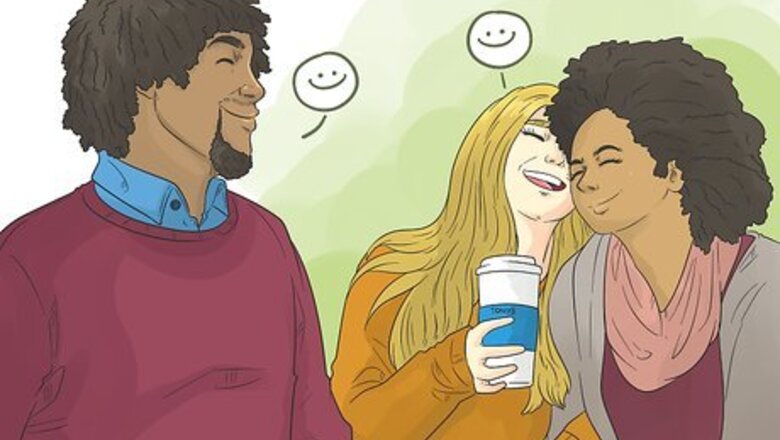
views
Appearing Happy

Smile to make others happy. When you smile, you automatically appear happier to other people. Also, smiling makes you seem more attractive and relaxed, which also contributes to the appearance of overall happiness. Actually, the brain perceives another person smiling as a reward. Therefore, when you smile at someone, it makes their brain happier. It also helps to laugh at other people's jokes. However, only smile when it seems appropriate. For instance, if someone makes a serious announcement, that's a time to skip the smile. Also, don't let your smile linger on for too long. If you do, people may think you're faking it. Try to smile genuinely. When you don't feel it, it can be harder to create a genuine smile. Make a conscious effort to give a full smile, as an uncommitted half-smile may not convince people. One way to help you smile more genuinely is to think of something that does make you happy, such as your kids or your kitten.
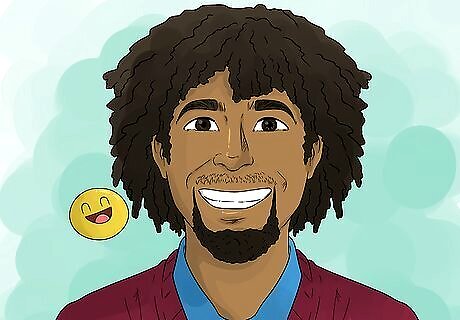
Smile to make yourself happy. Smiling actually has the power to make you happier. A smile signals to your body that you are happy, which in turn releases chemicals in your body that work towards your happiness. For starters, neuropeptides are released, which help fight off stress. Also, endorphins, dopamine, and serotonin are also released. These neurotransmitters also help you calm down and be happier.
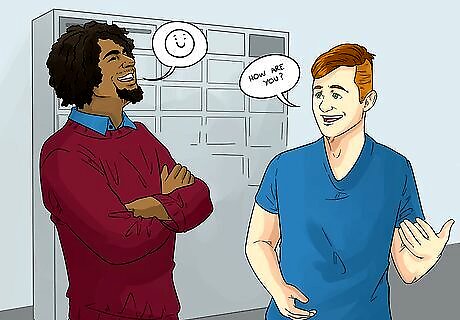
Respond convincingly to questions of well-being. When someone asks you how you're doing, you can't say how you really feel if you're feeling down and want to appear happy. Therefore, you're going to need to fake it for the answer and give a response that they will believe. One way to respond convincingly is to pretend you're an actor or actress. Take on the part of the person you're playing. How would a happy person respond to a question like "How are you?"? They'd respond with a peppy answer and a smile. Keep it short. Most of the time, people don't really want to know how you're doing. A short "I'm doing great!" is all that's really needed in polite conversation.
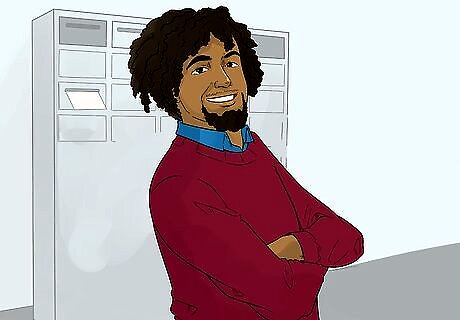
Act confident. Being confident can help you portray a sense of happiness, even when you're not feeling it. When you act confident, people perceive you as confident, so you don't even need to feel the confidence for it to work. However, like happiness, acting confident can help you feel more confident. One way to look and feel more confident is to stand up straight. If you're slouching down, you're not exuding confidence. Also, look people in the eye. Always looking down or away is a sign of insecurity. When speaking, talk in a tone loud enough to hear. Enunciate your words, speaking distinctly. Don't be afraid to crack a joke. Confident people often use humor to lighten up the mood.

Go about your normal routine. Often, if you're sad, you want to slow down your life for a little while. You may want to mope or hide out at home. However, if you're trying to act happy, you need to at least go through the motions of your normal routine, such as going to work, meeting friends, and being with your family.
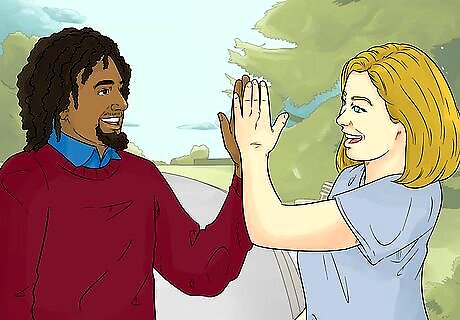
Be enthusiastic. Enthusiasm is not the same as happiness, but it can pass for it in a pinch. If you throw yourself into your life, embracing it with gusto, you'll appear happier, and in fact, you may make yourself happier in turn. Use your words. One way to show enthusiasm is to say how excited you are about something. For instance, say a new project comes up at work, and your boss wants people to volunteer. You could say, "I'd love to work on that project. It sounds fascinating." Also, it almost goes without saying, but try not to actively criticize whatever you're trying to be enthusiastic about. Saying "That's so dumb" does not exude enthusiasm. It's also about your tone of voice. You don't want to make your tone too peppy, as that can come off as sarcastic, but you do need some peppiness in your voice to show your enthusiasm. Enthusiasm is a kind of vulnerability. That is, holding yourself back or pretending you don't like something is a way of protecting yourself. When you say you like something, you're stating an opinion that others can judge. Also, being generous with your praise to other people can make them happier, which makes them feel happier when they see you. They'll project some of that happiness on to you.
Being Happier
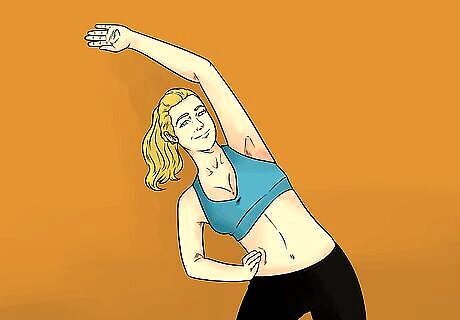
Go exercise. Exercise makes you healthier overall. However, it can also make you happier. For one, your brain thinks exercise is a type of stress, so it releases a protein in your brain that encourages you to be more relaxed. Your body also releases endorphins, which are intended to fight the pain of exercise and lead to happy feelings. Exercise can also help you sleep better, which you may have trouble doing when you're not as happy. In addition, it can increase your self-esteem, making you happier overall. Try different exercises to find ones you like. If you don't like soccer, try dancing. If tennis isn't your thing, take up swimming. Aim for at least 150 minutes a week of exercise. Some people suggest getting in 20 minutes of exercise every morning to jump-start your day.
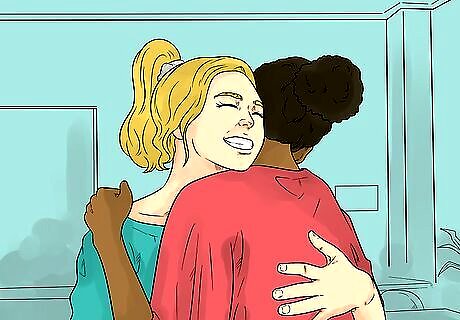
Practice gratitude. People who are grateful and find ways to express it are generally happier overall than people who don't. Gratitude is the active practice of being thankful for the things and people in your life. Try to actively thank the people in your life for what they do and who they are. Don't just think it--tell them. Another way to practice gratitude is to keep a gratitude journal, where you write down things you are thankful for every day.

Encourage curiosity. Happy people often seek out adventure. They want to try new things, explore new cultures, and see new places. They maintain a sense of awe about the world and find ways to make each day an adventure. Don't think you need lots of money to maintain curiosity. You can do it in your own city. Try a new cuisine you've never had before, or take a class in something you've always been interested in. Explore parts of the city you've never seen or go to a cultural event. Always be looking for something new to pique your interest.

Learn to love yourself. The happiest people have good self-esteem, meaning they like who they are. If you've always been down on yourself, learning to turn that around could contribute to you being happier in general. One way to start seeing yourself more positively is to make a list of all your strengths and the things you admire about yourself. Think about compliments you've received or ask a friend to help if you can't get started. Try to stop negative thinking. When you start thinking negatively about yourself, try to turn it into something positive or at least something realistic. For instance, if you think, "I hate my body," turn it into, "I don't always like the way my body looks, but I appreciate all the things my body does for me, like letting me hug my children, cook good food, and enjoy the sunshine."
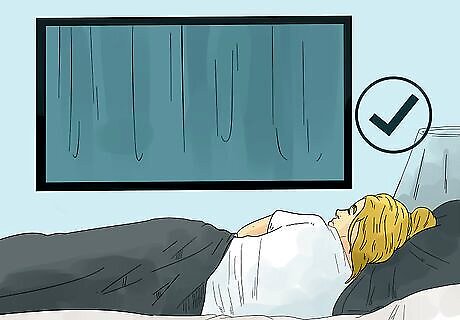
Take care of yourself. Taking care of yourself can work towards your happiness, as when you're unhealthy, your body knows it. In turn, you don't feel as good, which can contribute to unhappiness and low self-esteem. Make sure you are getting enough sleep. Get the required 8 hours of sleep a night by making sure you go to bed on time and giving yourself an hour of downtime before you should be asleep. Don't forget to eat healthily. Stick with low-fat proteins, such as chicken and fish, and focus on whole grains, fruits, and vegetables with some low-fat dairy on the side.

Find hobbies you love. Doing things you enjoy can make you happier, especially if you do those hobbies on a regular basis. Any activity that you enjoy can count as a hobby, even going to the movies. However, if you can find an activity where you are able to get into a creative "flow" that blocks out the world, that's even better. If you're not sure what hobby you might like, try exploring different hobbies by checking out books at the library. Once you figure out a hobby you want to try, look at community classes. Check with your local parks and recreation department or community college.
Working on Depression
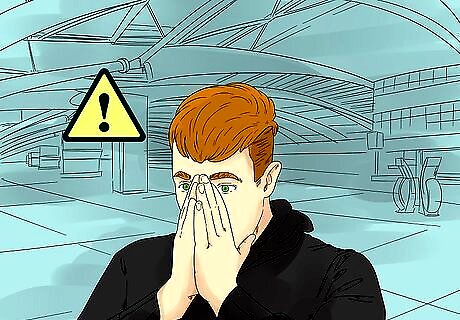
Look for signs of depression. Depression is a clinical disorder that affects your mood. One common symptom of depression is staying in a sad or anxious mood for long periods of time or feeling hopeless. If you think you need to put on an act to be happy, you may be experiencing symptoms of depression. Other signs of depression are often feeling guilty or worthless or not having as much pleasure or interest in hobbies and activities. You may also feel more tired or have trouble focusing. Your memory can suffer, and you may be more indecisive. You might also have trouble sleeping, or your weight could go up and down. Thinking about suicide or harming yourself is another symptom. Depression can come on at certain times in your life, such as after pregnancy. Other people experience depression just during the winter when there's less light, called seasonal affective disorder.
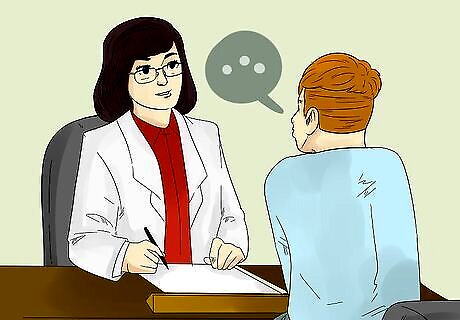
Go to counseling to help with depression. A therapist can help you address some of the problems that are contributing to your depression. Some common types of therapy that may help with depression are problem-solving therapy, interpersonal therapy, and cognitive-behavioral therapy. If you have a friend who's been in therapy before, consider asking them for a recommendation for a counselor. It can help you narrow down the search. If you're worried about affording counseling, look at sliding scale clinics in your area, which bases your payment on what you make.
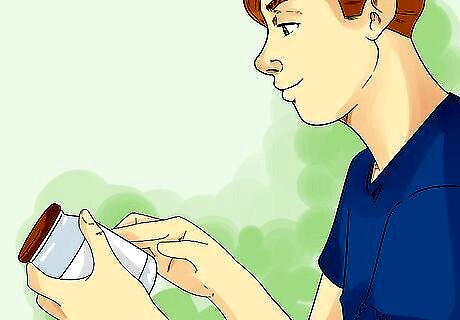
Try an antidepressant. If you feel like you have to put on a happy act all the time, maybe your body needs some chemical help to make you feel happier. Depression is a chemical imbalance in the brain, and antidepressants can work to correct that imbalance. Different antidepressants work in different ways, so talk to your doctor about which one is right for you. One common type of antidepressant is a selective serotonin reuptake inhibitor or SSRI. Common medications in this category are sertraline (Zoloft), fluoxetine (Prozac), and paroxetine (Paxil). The plus side to these antidepressants is they generally have fewer side effects than other antidepressants. Another category is serotonin and norepinephrine reuptake inhibitors (SNRIs). In this category, you have venlafaxine (Effexor XR) and duloxetine (Cymbalta), among others. Bupropion (Wellbutrin) is a norephedrine and dopamine reuptake inhibitor (NDRI). The good side of this medication is it less likely to affect your sex life.













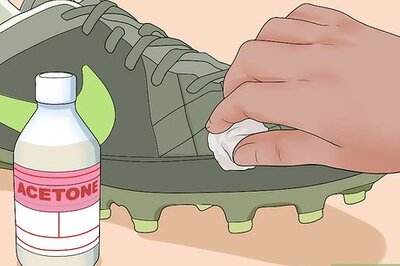






Comments
0 comment